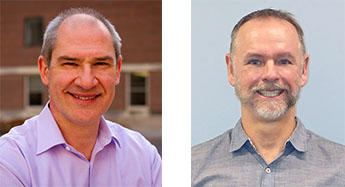Periodontology lab awarded $848,000 to investigate oral disease prevention

Two grants to the University of Minnesota School of Dentistry from the National Institute of Dental and Craniofacial Research of the National Institutes of Health will support research to identify new approaches to preventing thrush and periodontitis.
Diseases of the mouth are costly and can lead to loss of teeth, a diminished quality of life and life-threatening systemic infections.
Associate Professor Massimo Costalonga, DMD, PhD was awarded a research grant of $424,000 to investigate the cellular biological causes and potential prevention of oral thrush. Research Specialist Peter Bittner-Eddy, PhD, was awarded $424,000 to support work to investigate periodontitis, which is a chronic inflammatory disease of the gums.
Thrush is a condition in which the fungus, Candida albicans, over-accumulates on the lining of the mouth and tongue sometimes causing painful infection and spreading to other parts of the body. Building on previous findings, Dr. Costalonga and his team will explore how immune cells located within the epithelium of the oral mucosa regulate protection against Candida albicans. Prior research indicates Intraepithelial Langerhans cells, a specialized phagocytic cell population, seems to regulate the numbers of anti-yeast T cells.
“With this grant we will determine whether the migration of Langerhans cells to lymph nodes or their local activity via production of certain cytokines, aid the expansion of anti-yeast T cells and protect against candida infection,” said Dr. Costalonga. “This new knowledge will help us develop therapies to manipulate and modulate the behavior of these anti-yeast immune cells to improve protection and improve vaccine design against candida."
Periodontitis is a chronic inflammatory disease that is the leading cause of gum tissue destruction and tooth loss. It results from a local destructive inflammatory response against a microbial biofilm surrounding the tooth. Dr. Bittner-Eddy will explore two hypotheses to determine how neutrophils regulate this destructive immune response. One hypothesis examines if neutrophils secrete chemical signals that recruit a specific type of destructive T cell to disease sites. The second hypothesis examines if neutrophil-like cells actively suppress effective immune responses thereby exacerbating the disease state.
“Neutrophils are one of the first immune cell types recruited to sites of potential periodontal disease and they arrive in significant numbers. They themselves can act as agents of tissue destruction, but nothing is known about how they interact or modulate the behavior of other destructive immune cells that appear at later stages of disease,” said Dr. Bittner-Eddy. “Through understating the good, the bad and the ugly aspects of neutrophils in periodontal disease, we can develop therapies that dampen the bad qualities without impacting the good."
The University of Minnesota School of Dentistry advances health through scientific discovery, innovative education, and the highest-quality care for all communities. The school receives an average of $7 million annually for research and discovery from government and private sources to improve health.